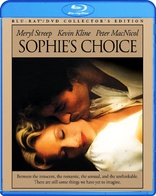Sophie's Choice Blu-ray Movie
HomeSophie's Choice Blu-ray Movie 
Collector's Edition / Blu-ray + DVDShout Factory | 1982 | 150 min | Rated R | Apr 29, 2014
Movie rating
7.3 | / 10 |
Blu-ray rating
| Users | 3.0 | |
| Reviewer | 4.0 | |
| Overall | 3.9 |
Overview
Sophie's Choice (1982)
Sophie is the survivor of Nazi concentration camps, who has found a reason to live in Nathan, a sparkling if unsteady American Jew obsessed with the Holocaust. They befriend Stingo, the movie's narrator, a young American writer new to New York City. But the happiness of Sophie and Nathan is endangered by her ghosts and his obsessions.
Starring: Meryl Streep, Kevin Kline, Peter MacNicol, Josh Mostel, Robin BartlettNarrator: Josef Sommer
Director: Alan J. Pakula
| Drama | 100% |
Specifications
Video
Video codec: MPEG-4 AVC
Video resolution: 1080p
Aspect ratio: 1.78:1
Original aspect ratio: 1.85:1
Audio
English: DTS-HD Master Audio 2.0
Subtitles
English SDH
Discs
50GB Blu-ray Disc
Two-disc set (1 BD, 1 DVD)
DVD copy
Playback
Region A (locked)
Review
Rating summary
| Movie | 4.5 | |
| Video | 3.5 | |
| Audio | 4.0 | |
| Extras | 2.5 | |
| Overall | 4.0 |
Sophie's Choice Blu-ray Movie Review
Truth and consequences.
Reviewed by Jeffrey Kauffman April 2, 2014A number of fictional characters’ names have entered the popular lexicon as examples of types—think of Ebenezer Scrooge or Svengali for a couple of potent examples. But fictional titles seem to be less apt to make their mark on the public consciousness, at least as a symbol for something greater than a mere label. William Styron’s 1979 novel Sophie’s Choice is one of those rare exceptions, a title which has become emblazoned upon countless readers and, ultimately, viewers of the 1982 film adaptation, a title which of course signifies much, much more than its almost quaint, almost mundane, surface quality would seem to denote. Styron was a conflicted man himself, as he revealed in his blistering memoir Darkness Visible, and his writing in the source novel of Sophie’s Choice managed to weave together several generations of injustice and Man’s inhumanity to Man. While the film jettisons some of the sidebars of Styron’s original thesis, its central focus on a trio of characters with deep psychological wounds remains palpably visceral in Alan J. Pakula’s adaptation. The film marked Meryl Streep’s first Academy Award win for Best Actress, in what was one of the fiercest two way races of that era. Interestingly, Streep’s main competition was Jessica Lange in the highly fictionalized biography of screen and stage star Frances Farmer in Frances, and while not particularly germane to understanding Sophie's Choice, there are still a couple of odd synchronicities between Styron, Styron’s Sophie and the real life Farmer that, along with this hotly contested Oscar race, add up to some striking coincidences which may interest trivia fans. Styron, like Farmer, had bouts of depression and mental illness, and in a perhaps even weirder coincidence, he utilized a poem of Emily Dickinson’s to cap Sophie’s tragic life; as it so happens, Farmer’s own ghost written autobiography was named after a famous Dickinson poem, Will There Really Be a Morning?. Lange of course was given a “consolation Oscar” that year as Best Supporting Actress in Tootsie, and while some have accused Streep’s embodiment of Sophie to be “mere” mechanical technique (“click, click, click”, as one Katharine Hepburn was alleged to have said), less strident observers are almost certain to be devastated by a portrayal of a woman trying to come to terms with the ramifications of a decision between two equally hideous options.
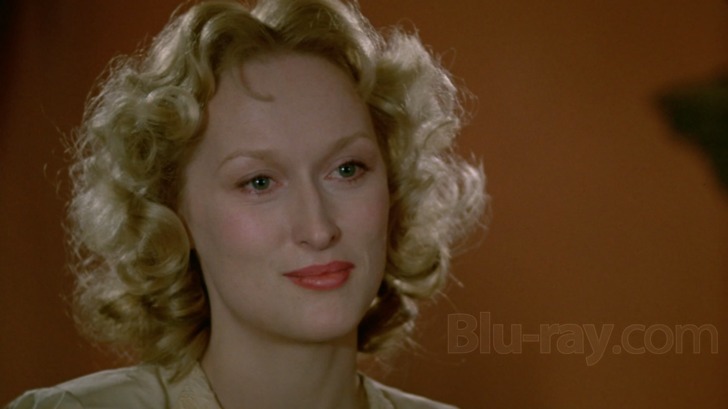
While the central tenet of Sophie’s Choice might be compared to Robert Frost’s immortal poem The Road Not Taken—i.e., every choice has unforeseen consequences as well as inevitable regrets—the story is also indelibly linked to matters of memory. The structure of Sophie’s Choice therefore plays out like the cinematic equivalent of nesting dolls, with interlocking remembrances helping to define its three central characters. The actual central reminiscence of the film is not in fact Sophie’s, but that of a southern would be writer named Stingo (Peter MacNicol). Stingo has ventured north to Brooklyn to experience big city life in an “alien” environment, and he is almost instantly entranced by the antics of two of his fellow boarding house residents, Polish immigrant Sophie (Meryl Streep) and her lover Nathan (Kevin Kline). Stingo’s perhaps genteel Southern Gentleman ways are thrown for a bit of a loop by the tempestuous emotional outbursts of Nathan, but he senses an almost immutable bond between Nathan and Sophie that similarly fascinates him.
Note: If you’re not already aware of what the “choice” in the film’s title refers to, you may want to skip the rest of the content portion of the review and move on to the technical aspects, below.
It’s within this context that Sophie’s memories begin to inform the film. Pakula’s treatment of Styron’s novel is rather well attuned to the source material, doling out information in increasingly upsetting dribs and drabs, as we come to know Sophie’s heart rending back story. Stingo's glimpse of Sophie's arm tattoo gives him some insight into the tribulations she's faced, but he begins to ask her questions, perhaps interested in writing about her story. Though she was not Jewish, Sophie ended up in a concentration camp, and that several members of her family perished in similar environments. The “choice” Sophie has to make with regard to her children, one which has since become so indelibly imprinted upon the general public consciousness, is only revealed in a relatively late climactic revelation that suddenly casts much of what has gone before in an even more dramatic light. Playing out against these memories is an unsettling Holocaust obsession on the part of Nathan, one which makes his interest in Sophie seem at times almost like a groupie's infatuation for a rock star.
What’s remarkable about Sophie’s Choice as a whole and the “choice” in particular is how the film deals dialectically with the “present” day, which frequently includes almost improbably joyous celebrations between the three characters, and the horrors of the past which continue to reside in the characters’ memories, ever present. Are Sophie and her cohorts in denial? That’s certainly one of the issues Styron attempts to investigate, and one which plays perhaps an even more important part in Nathan’s story than in Sophie’s. Sophie in fact seems to be tragically resigned to her fate, eking out whatever happiness she can, while Nathan, it soon becomes apparent, is delusional and actually mentally unbalanced.
Sophie's Choice is, to use theatrical parlance, more or less a "three hander", built almost entirely upon the interactions between Sophie, Nathan and Stingo. Pakula cast this film just about perfectly (amazingly, Styron evidently had Ursula Andress in mind for Sophie when he wrote the original novel). There has rarely been a character who goes through as many intense emotions as Sophie experiences in this film, and Streep never overplays her hand, making the ultimate tragedy of Sophie's life all the more moving. Rather incredibly, this was Kevin Kline's first film (how he came to be cast is discussed in the roundtable included on this Blu-ray as a supplement). Nathan is a much showier, more manic, role, and Kline manages to toe a line between naturalism and a certain hyperbolic element that's inherent to Nathan's incipient madness. MacNicol has often been the overlooked element in this film, but his Stingo is remarkably nuanced and well crafted, moving from a certain certain naïvete to a growing awareness of the cruelties life has to offer —perhaps even to him.
While Stingo’s increasing romantic attachment to Sophie is perhaps the film’s most predictable element, there’s another, subtler, aspect which ties the two characters together. As is subliminally suggested by the structure of the film itself, Stingo and Sophie and bound together ineluctably by their memories. Stingo more or less cajoling Sophie into divulging secrets of her past has now burdened him with those very memories. Does his recounting of the entire saga act as some sort of virtual exorcism? The film’s final image would suggest that there’s an inescapable quality to Sophie and her story—something that probably just about every viewer of this devastating and unforgettable film will experience themselves.
Sophie's Choice Blu-ray Movie, Video Quality 
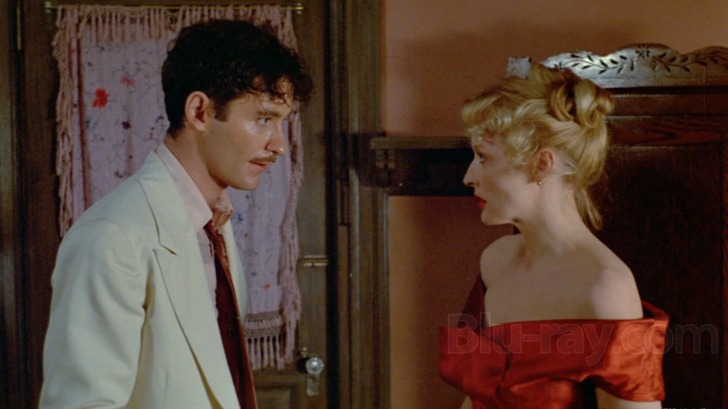
Sophie's Choice is presented on Blu-ray courtesy of Shout! Factory with an AVC encoded 1080p transfer in 1.78:1. Fans of the film who have had previous home video releases of the title will know this film has never looked stellar in prior formats, and while some of the problems have been ameliorated in this new high definition presentation, there are still some niggling issues of concern. Chief among these is the somewhat variable color timing. Lots of the film now looks better than it ever has before, with richly saturated—and accurate—looking colors (see screenshot 10 for one particularly excellent example). However, there is still a somewhat yellow cast over some sequences of the film, notably a lot of the interior scenes with Sophie and Nathan inside the boarding house. This makes flesh tones look positively jaundiced at times, as well as altering the overall palette, including skewing true reds toward the orange side of the spectrum. The elements are in generally quite good shape, though eagle eyed viewers will catch some readily apparent flecks, specks and even an errant scratch or two. Nestor Almendros' Oscar nominated cinematography is intentionally gauzy quite a bit of the time, which some may mistake for softness in the transfer. That said, this is not an overly sharp looking presentation, something that may be the biggest overall letdown for those wishing to upgrade from their DVD. (It's interesting to note that years before Schindler's List, Pakula and Almendros chose a desaturated, almost monochromatic, palette to depict the Holocaust.) Contrast, while still occasionally problematic, is noticeably improved and more consistent than on the DVD. There is a noticeable layer of fine grain apparent throughout this presentation, one which grows somewhat in the darker segments, where Pakula and Almendros may have pushed the film). The image is stable and no signs of digital sharpening were detected (the overly artificial sharpened appearance of the DVD was one of its prime drawbacks).
Sophie's Choice Blu-ray Movie, Audio Quality 
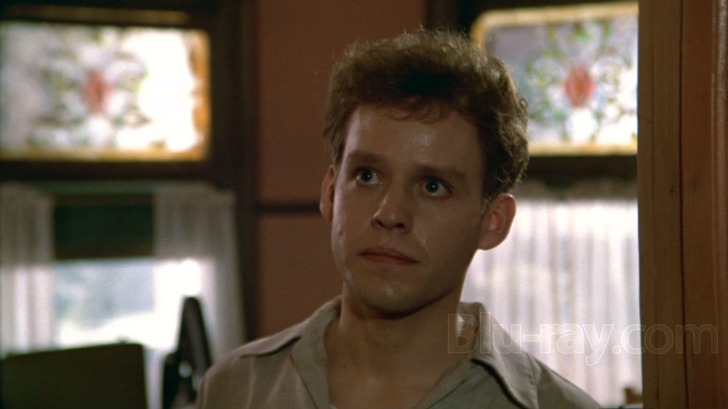
Sophie's Choice features a lossless DTS-HD Master Audio 2.0 mono mix which recreates the film's original sound mix very faithfully. Dialogue is well rendered here, clearly and cleanly (with forced subtitles when various characters lapse into other languages). Marvin Hamlisch's Oscar nominated score sounds fine, with a perhaps surprisingly full sounding midrange. The track shows no signs of damage or any age related issues.
Sophie's Choice Blu-ray Movie, Special Features and Extras 
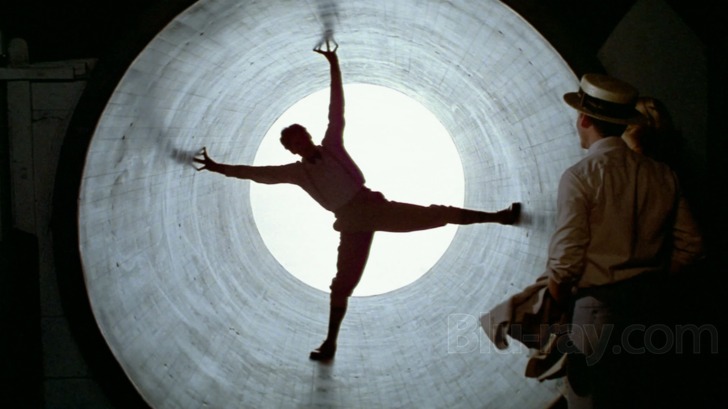
- New Roundtable Discussion with Meryl Streep, Kevin Kline and More (1080p; 45:41). That Gilligan's Island "and the rest" more refers to such people as Boaty Boatright, Alan J. Pakula's friend, one time agent and collaborator; Rose Styron, William's widow; Hannah Pakula, Alan's widow; and Don Laventhal, Pakula's former Executive Assistant. This is a really nice conversation between these people, hosted by Boatwright and covering everything from casting to the novel's writing and its adaptation to the screen.
- Audio Commentary with Alan J. Pakula. This is an unusually thoughtful and exhaustive commentary, one that gets into both stylistic choices (including the use of narration) and Pakula's own adaptive and filming processes.
- Theatrical Trailer (480i; 2:50)
Sophie's Choice Blu-ray Movie, Overall Score and Recommendation 
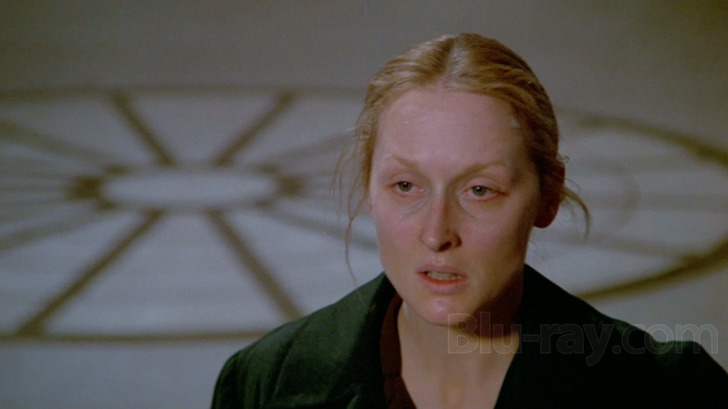
A tragedy on the epic scale of the Holocaust often seems to exist in some weird kind of abstract reality where the overwhelming nature of it all seems to remove the impact from any given individual. Sophie's Choice upends that tendency, making the horrors of the concentration camp experience an almost unbearably intimate experience. Pakula's unusually faithful adaptation of Styron's novel is incredibly harrowing, and the film certainly doesn't shy away from depicting the long lasting psychological scars survivors suffered. Streep delivers one of the most legendary performances of her career in this film, and she's matched beautifully by the manic Kline and more restrained MacNicol. This Blu-ray may not offer perfect video, but it's at least an incrementall upgrade from the DVD. The new roundtable is a very worthwhile new supplement, though the omission of the documentary included on the DVD is disappointing. Highly recommended.
Similar titles
Similar titles you might also like

Albert Nobbs
2011

Lilith
1964

Factory Girl
2006

The Master
2012

Still Alice
2014

The Private Lives of Pippa Lee
2009

Blue Jasmine
2013

Tunes of Glory
1960

Europe '51
Europa '51 / The Greatest Love / English and Italian Versions
1952

Brideshead Revisited
30th Anniversary Edition
1981

Stromboli
Stromboli, terra di Dio / English and Italian Versions
1950

Cavalcade
80th Anniversary / Fox Studio Classics
1933

Adore
Perfect Mothers
2013

This Happy Breed
1944

Flashbacks of a Fool
2008

Norma Rae
35th Anniversary Edition
1979

A Delicate Balance
1973

Hamlet
2009

The Children's Hour
1961

The Fisher King 4K
1991
